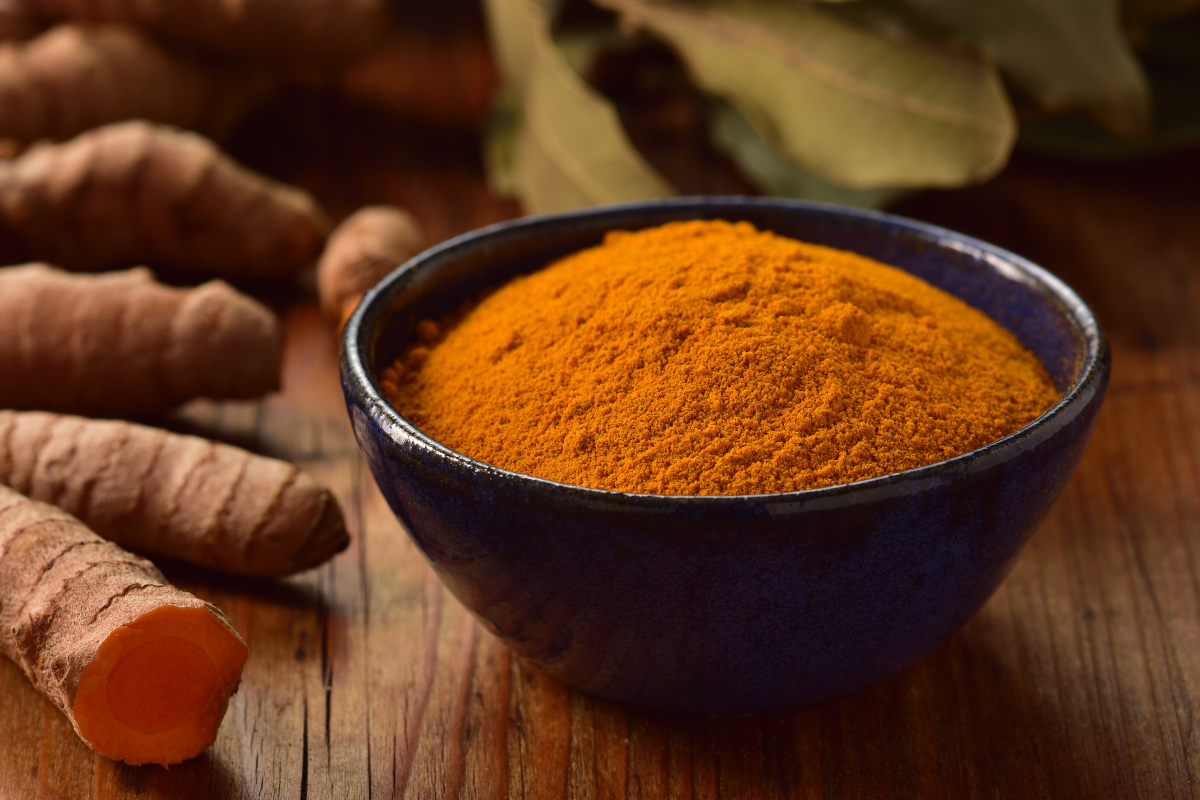Curcumin: A Menopause Superfood

Known for its vibrant, golden color, turmeric provides a treasure trove of benefits. The spice is a staple of Asian cuisine and has been used in complementary medicine for hundreds of years. The primary component of turmeric is curcumin, a chemical compound rich in health-promoting properties.
Health Benefits of Curcumin
As our cells make energy from carbon and oxygen, unstable oxygen molecules known as free radicals are created as byproducts. To stabilize themselves, they steal electrons from other molecules in our body. This can cause damage to various types of cells, including DNA. Too many free radicals can lead to health problems like cancer and heart disease.
Antioxidants neutralize free radicals and help to prevent further damage or disease. Many plant foods are rich in antioxidants, and turmeric is one of them.
Curcumin is a powerful antioxidant that seeks out free radicals. Numerous studies have shown that curcumin removes these unwanted free radicals from the bloodstream.
Inflammation is our immune system’s response to injury or outside invaders, like viruses or bacteria.
Chronic inflammation occurs when the immune system continues to pump out inflammatory cells even when the danger has passed. The cells then begin to attack healthy tissue resulting in conditions including heart disease, Alzheimer’s disease, and arthritis.
The anti-inflammatory properties of curcumin have garnered much attention, and it is widely considered one of the most powerful natural treatments for disease. It has been shown to reduce inflammatory responses and improve symptoms of irritable bowel syndrome (IBS), arthritis, depression, and atherosclerosis.
Does Curcumin Help with Menopause Symptoms?
Curcumin can be beneficial for everyone, but it may provide extra benefits to women experiencing menopause symptoms.
Hot Flashes
Hot flashes are one of the most bothersome symptoms during menopause; 80% of women experience hot flashes in perimenopause and beyond. A recent small study showed that in a group of women aged 40-60, those receiving curcumin supplements experienced fewer hot flashes within four weeks.
Weight and Lipids
Research shows that when estrogen levels drop during menopause, women may experience higher LDL cholesterol and triglyceride levels. A study of postmenopausal women found that compared with placebo, curcumin supplementation decreased fasting blood glucose, total cholesterol, and triglycerides.
A study of perimenopausal women showed that over three months, those eating turmeric improved their body weight, waist circumference, and fasting blood sugar. The researchers speculate this is partly due to the anti-inflammatory and antioxidant properties.
Brain Health
Brain fog is another common concern for those in menopause. In addition to its anti-inflammatory properties, curcumin may be neuroprotective (protect brain function).
A study of middle-aged and older adults found oral intake of curcumin improved memory performance over 18 months. The same study found that curcumin may help stabilize mood and prevent the buildup of plaque associated with Alzheimer’s disease.
Joint Pain
Declining estrogen levels in menopause can contribute to joint pain and stiffness. The anti-inflammatory properties of curcumin can help ease this pain.
A study of patients managing joint pain from osteoarthritis found curcumin supplementation to be just as effective as pharmaceutical treatment without negative side effects. Furthermore, a study of estrogen-deficient rats found curcumin lessened symptoms of osteoarthritis.
Cooking with Turmeric
Turmeric can add flavor, warmth, and color to a variety of dishes. You can sprinkle it onto roasted vegetables, add it to marinades for meats, or mix it with rice or pasta. You can blend it into a bright, sunny smoothie, make it into a tea, or add it to soups and curries.
Curcumin on its own is poorly absorbed by our bodies, and it takes a large amount to reap the benefits. However, adding black pepper helps your body absorb more of the curcumin in turmeric. In fact, one study found that when 20 milligrams of piperine was paired with 2 grams of curcumin, absorption was increased by a whopping 2000%.
Black pepper contains piperine, a bioactive compound that has several health benefits of its own. Similar to turmeric, piperine has antioxidant properties and may reduce inflammation.
Next time you are cooking a dish, try adding a pinch of turmeric and black pepper. It just may be the answer to your menopausal symptoms.
A Recipe for Golden Milk
A popular way to consume turmeric is golden milk. A variant of traditional Indian haldi doodh, or turmeric milk, golden milk is made by warming milk and adding ingredients like turmeric, black pepper, and cinnamon. It is often consumed before bed and has been shown to promote relaxation and a good night’s sleep.
Ingredients:
- 1/2 cup of unsweetened milk of your choice
- 1 tsp of turmeric
- 1 small piece of grated fresh ginger or 1/2 tsp of ginger powder
- 1/2 tsp of cinnamon powder
- 1 pinch of ground black pepper
- 1 tsp of sweetener of your choice (optional)
Directions:
To make the golden milk, mix all ingredients in a small saucepan or pot and bring to a boil. Reduce the heat and simmer for about 10 minutes or until fragrant and flavorful. Strain the drink through a fine strainer into mugs and top with a pinch of cinnamon.
Enjoy!
Sign up for more unique women’s health content
By submitting this form, you agree to the Lisa Health Privacy Policy and Terms of Use


